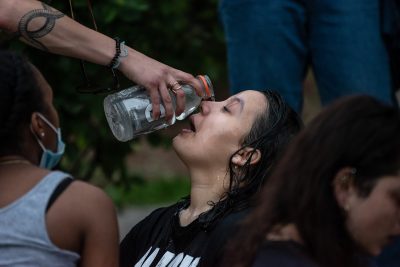As the Black Lives Matter movement surges on, police across the country have been utilizing chemical irritants such as tear gas at protests.

Advocates’ disapproval of these riot control agents brought an amendment to the Massachusetts State House floor that would have banned state police from using tear gas and other chemical agents, including pepper spray.
Representatives overwhelmingly rejected the amendment in a vote, 38 to 121, on July 23. Massachusetts police will continue to use riot control agents.
The amendment was part of the text recommended by the House to replace a majority of a Senate bill to reform police standards.
State Rep. Mike Connolly wrote to fellow members of the House in his proposal for the amendment that he started his work to ban tear gas after being “advised” by the American Civil Liberties Union at a Black Lives Matter protest.
If tear gas is banned in war, Conolly wrote, it should not be used on civilians.
Under the Geneva Protocol of 1925 after World War I, the use of chemical weapons — even non-lethal ones such as tear gas — in wars is prohibited. However, the U.S. declared an exception allowing law enforcement to use these agents in riot control.
Tear gas causes irritation to the respiratory system and skin by temporarily causing burning, blurring of vision and coughing, among other complications, according to the U.S. Centers for Disease Control and Prevention.
A study conducted by the U.S. military also found continued exposure to tear gas increases the risk of respiratory infections.
Amesh Adalja, senior scholar on infectious diseases at Johns Hopkins Center for Health Security, said protesters could become more vulnerable to COVID-19 after being exposed to tear gas.
“They’re likely to rub their eyes, they’re likely to cough,” Adalja said. “So they can infect themselves or spread the virus to others because of the symptoms that are induced by the tear gas.”
State Rep. Michael Day, vice chair of the Judiciary Committee, opposed Connolly’s proposal. He said in an interview that complete restriction of tear gas “went too far” from providing police a non-lethal means to contain violent situations.
“We strictly regulate the use of tear gas and other chemical weapons,” Day said, “and require all de-escalation tactics to be exhausted, or that the safety of the crowd is in imminent harm [before allowing] police to use non-lethal means to try to disperse and control the crowd.”
A police report must be filed with an independent commission if tear gas or chemical weapons are used in any situation and the commission will review and investigate if necessary, Day said
“This is an unwise prohibition on how police can control a violent situation in which de-escalation has been attempted,” Day said during the July 23 hearing. “Our officers must protect the safety of themselves and the crowd in a non-lethal way.”
The Massachusetts Coalition of Police released a statement that the amendment was a detriment to police’s ability to protect.
The police reform bill is “harmful to not only police, but to all citizens of the Commonwealth,” the organization wrote on July 24. “Sadly, as more than 16,000 officers statewide go to work each day at risk of not returning to their families — there are those on Beacon Hill who wish to punish police officers just for being police officers.”
Rep. Jack Patrick Lewis supported Connolly’s amendment, comparing the use of these chemical agents to the “horrors of war and authoritarian regimes.”
“Countless people, again, exercising their constitutional rights, were harmed by tear gas,” Lewis wrote in an email, “that is banned in most countries and on battlefields by international treaty.”
Tear gas and pepper spray were used throughout June by Massachusetts police at protests against police brutality in Boston and across the state.
“Many chiefs of police at a rally in my own city of Framingham on Tuesday said that the issues of police brutality don’t occur in our communities,” Lewis wrote. “The question I have today is why the hell, then, was tear gas used against protesters in Brockton?”




























































































































